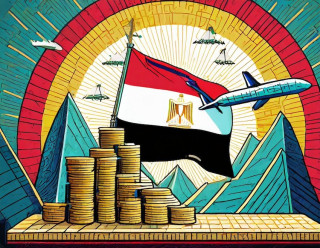The Central Bank of Egypt is about to make decisions that could attract foreign investors to Egypt
"Billions of Gulf dollars are heading to Egypt as the Middle East war rages", according to a report by the news agency, Bloomberg. Ahmad Abdel-Rahman explains what this means.
A Bloomberg report said that Egypt has moved from the brink of economic disaster to obtaining more than USD40 billion in investments and loans from the United Arab Emirates (UAE) and the International Monetary Fund (IMF) in just 10 days, with the possibility of more financing coming from Saudi Arabia and other countries as well.
"Egypt undertook its largest interest rate increase ever and allowed its currency to depreciate by more than 38 per cent in a long-awaited flotation," the report said.
It stated that the Egyptian decision came from various parties led by the oil-rich Gulf Cooperation Council (GCC) countries and the IMF, with the support of the US. They aimed to achieve stability in Egypt, which is extremely important since the whole region has been affected by high inflation and the war in Gaza.
The report explained that foreign investors praised the steps Egypt has taken to date and expect it to attract billions of dollars through bonds in the coming months. Egypt's next step is likely to be a multi-billion-dollar investment with Saudi Arabia while Egyptian and Saudi authorities are holding initial talks over development rights to the Ras Jamila area on the Red Sea coast, people familiar with the matter said.
The report indicates that negotiations between the Egyptian and Saudi authorities regarding Ras Jamila, which is located near the huge "NEOM" project in the Kingdom of Saudi Arabia, are still in their early stages, explaining that the site is much smaller than Ras Al-Hikma, which is about three times the size of Manhattan. However, any agreement could amount to several billion dollars, according to informed sources.
However, Monica Malek, chief economist at Abu Dhabi Commercial Bank, said: "The Egyptian economy was on the verge of collapse, and the size of the Ras El Hekma deal reflects the depth of the crisis," and added: "Neither the UAE nor the Gulf States want to see another Arab Spring or political unrest in Egypt".
Egypt's economic turmoil
Egypt's most recent economic turmoil began in 2022, when Russia's invasion of Ukraine sent commodity prices soaring, increased the cost of wheat and fuel imports, and led bondholders to exit en masse. Egypt also lost about USD20 billion, and Israel's war with Hamas in Gaza exacerbated the pressures, as tourism declined, and revenues from the Suez Canal, which is an important source of income for Egypt, decreased.
Egypt is a key mediator in ceasefire talks, along with the US and Qatar, and has been trying to get more aid into Gaza. However, Cairo has been resistant to calls to take in hundreds of thousands of Palestinian civilians from Gaza. Egypt believes that this not only undermines the Palestinian cause for establishing an independent Palestinian state but taking in refugees could constitute a security threat if Hamas members are among them.
The UAE's moves in Egypt, including buying stakes in Egyptian state-run companies, has prompted Saudi Arabia - which sees itself as the main regional political power - to accelerate its deal talks, according to some sources who told Reuters.
Omar Munib, chief Middle East and North Africa analyst at Eurasia Group, said that the UAE Ras Al-Hikma deal is likely to be followed by other deals with other Gulf Cooperation Council (GCC) partners, in addition to the cash flows expected by the IMF and the World Bank (WB). Munib stressed that all of this contributes to maintaining the stability of the local currency and meeting debt installment obligations, which may ultimately lead to improving Egypt's credit rating and thus reducing its borrowing costs.
Munib added that the GCC countries' orientation has changed a lot over the past years because in the past, the rich Gulf countries were an important source of support for Egypt. However, this position changed a lot over time as they sought to secure profitable investments in Egypt instead of providing only cash aid, especially since the war in Gaza made the economic situation in Egypt more urgent.
The Bloomberg report also confirmed that the war in Gaza has doubled the geopolitical importance of Egypt. This has made other countries in the region turn to help it achieve economic stability, given its size and the strength of its impact on the dynamics of regional politics.


Comments